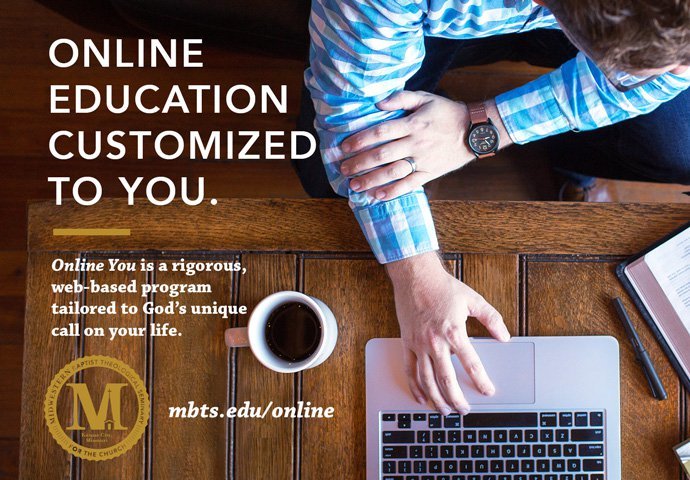This sponsored post was provided by Midwestern Baptist Theological Seminary.

For men and women currently serving in their local church, pursuing theological education can often seem like an ideal rather than a reality. Even for those interested in and eager to formally deepening their knowledge of God’s word and its application to mission and ministry, their commitment to their present role would seem to preclude having the available time or resources to do so. But the truth is, seminary education is actually more accessible and more affordable than it’s ever been. And even for those who cannot afford to pull up stakes and relocate, pursuing these studies as never been more in reach.
Thanks to the developments in both technology and in educational philosophies, distance learning has graduated from the realm of shady for-profit diploma mills and sketchy religious correspondence colleges. There are certainly distinct advantages to residential seminary education, but there are also distinct advantages to online seminary education, and some of them may surprise you.
1. Customizable
Gone are the days of the Play-Doh Factory online education experience, where everybody gets squeezed through the same lame programming regardless of their ministry calling or contexts. The improvements in web-based platforms and the rise of social media and other Internet communications tools have helped make online education both more streamlined and specific. Midwestern Seminary’s OnlineYou program, for instance, allows unique, student-customized tracks. Strategic, contextualized assignments allow students engaged in ministry to apply information learned in class while implementing skills used in day-to-day ministry. On certain assignments, students can even choose to apply class material as a pastor, teacher, or scholar would.
2. Credible
Not too long ago, the only seminary education you could get completely online came from obscure schools of questionable integrity. Now nearly every major seminary and Christian graduate school in the nation has a reputable online program. And outside accountability and oversight are just as strong as the internal vigilance to keep the programs robust. Midwestern Seminary’s online programs benefit from our full accreditation from both the Association of Theological Schools in the United States and Canada (ATS) and The Higher Learning Commission of the North Central Association of Colleges and Schools (HLC). You don’t have to say yes to diploma mills to be able to say no to leaving your current ministry context.
3. Affordable
For many aspiring students, it’s not just the cost of relocating (and all that comes with it) that prohibits seminary education but the cost of the education itself. Fortunately, online seminary education has never been more affordable. Recently ranked as the third most affordable seminary in the nation, Midwestern’s OnlineYou degree programs begin at just $315 per credit hour for qualified students. You don’t have to sacrifice credibility for affordability any more.
4. Accessible
You would online education, of course, to be accessible. That’s the appeal, especially for those with time and location constraints. But it’s not just the Internet age that makes education accessible – it’s also program structures and course scheduling. Midwestern’s OnlineYou program consists of six terms each year, so you are never more than a few weeks away from starting your degree. And online courses are offered in eight-week terms with full loads offered in the Spring, Summer, and Fall. You can take courses continually and proceed and finish according to your own schedule.
5. Applicable
In days past, even if you could afford a diploma from an online institution, it was likely in a vague or general field of study. Oftentimes, the degrees one could acquire through distance education did not carry the same weight as residential degrees, and often they didn’t correspond to students’ actual ministerial and professional needs. Now, however, nearly every seminary offers the opportunity to receive the same degrees offered residential students to those studying online. All of Midwestern’s undergraduate and graduate degrees are offered through the OnlineYou program, including the B.A. in Christian Ministry or Biblical Studies; the standard M.Div or M.Div with special concentrations in Church Planting, Counseling, or Leadership; the M.A. in Christian Education or Counseling; the standard MTS or MTS with numerous emphases; and more. The bottom line is, you can get the degree you want and need—no asterisks, no fine print—totally online.
Is online seminary education for you? Thousands more Christian ministers and leaders decide so every year, and the world of education is responding to this demand with increasingly customizable and increasing-in-quality programs. Don’t let time, money, or distance keep you from developing your biblical knowledge and ministry skills. For more information on Midwestern Seminary’s OnlineYou, visit mbts.edu/online today.
This sponsored post was provided by Midwestern Baptist Theological Seminary.










